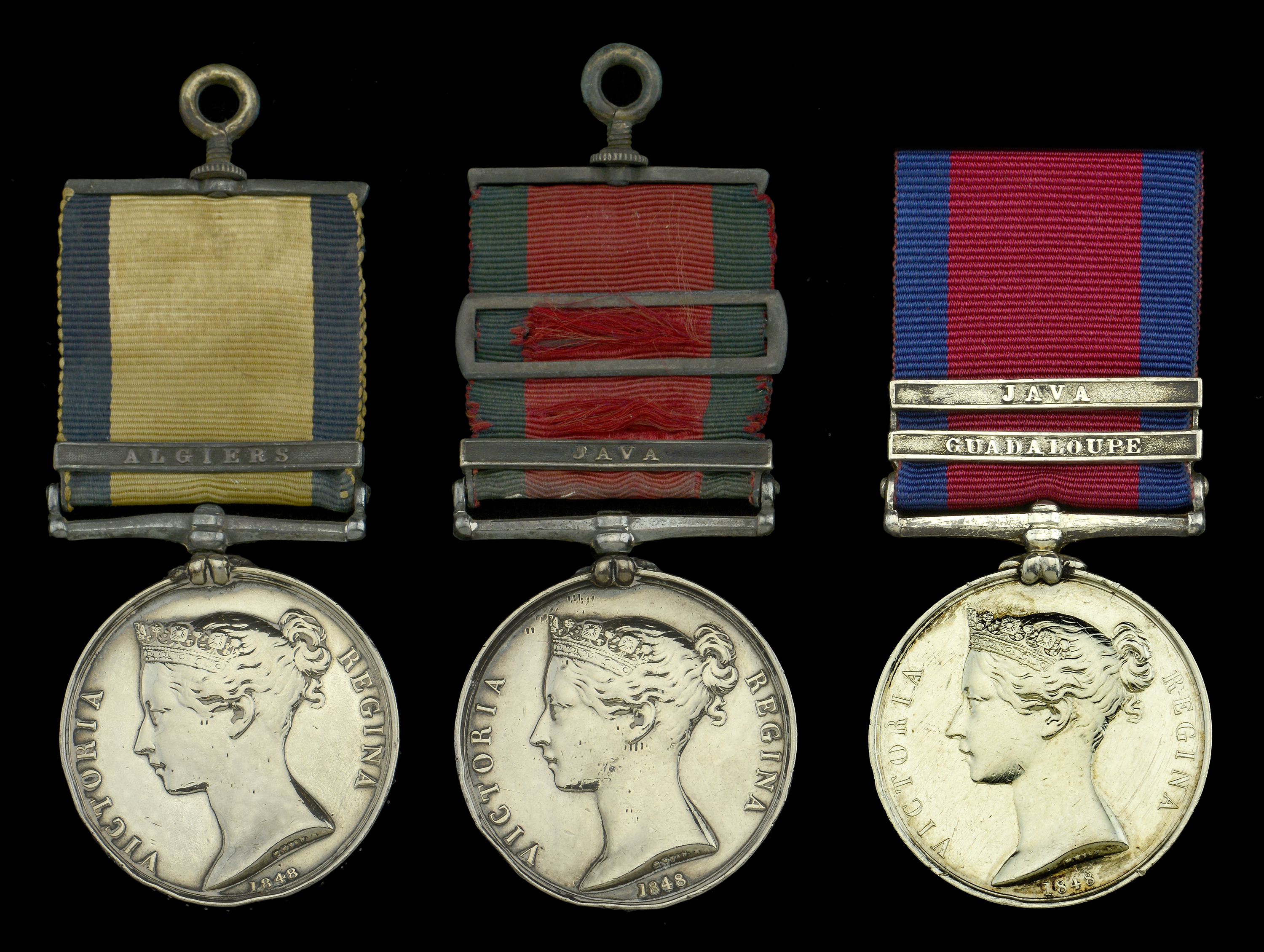The rare Military and Naval General Service medal pair awarded to Major-General James Clarke, Royal Marines Military General Service 1793-1814, 1 clasp, Java (James Clarke, 2nd Lieut. R.M.); Naval General Service 1793-1840, 1 clasp, Algiers (James Clarke, 2nd Lieut. R.M.) together with a second Military General Service 1793-1814, 2 clasps, Guadaloupe, Java (Jas. Clarke, Captn. R.M.) the first two with original ribbons with contemporary suspensions attached, edge bruising and contact wear, otherwise nearly very fine, the last with re-affixed suspension, nearly very fine (3) £16,000-£20,000 --- Importation Duty This lot is subject to importation duty of 5% on the hammer price unless exported outside the UK --- --- Provenance: Bonhams, December 2003, pair from family; M.G.S. with 2 clasps acquired privately in September 2014. Approximately 38 Military General Service medals awarded to Royal Navy and Royal Marine recipients James Clarke was born on 4 August 1788, the oldest son of the late Commander R. W. Clarke, Royal Navy. He joined the Royal Navy in March 1798, aged ten, aboard the sloop Pluto. After serving in her as a Volunteer and Midshipman, he joined the Romney in 1799, on the East India station, where he was successively lent to the hired armed transport Sea Nymphe, employed in conveying artillery and stores to Cosire in the Red Sea, and to the H.E.I.C.'s schooner Lady Popham. In the latter vessel, he was engaged in carrying despatches from Sir Home Popham at Mokha to General Hutchinson at Suez, where he was wrecked on a coral reef off Yembo. Twenty one of the crew drowned, whilst thirteen survived, escaping in two boats and made their way to Jiddah. The Romney returned to England and was paid off in 1803. He entered the Royal Marines as Second Lieutenant on 19 September 1808, and in the early part of 1809 sailed with the troops in the Dolphin for the West Indies, where, joining the Neptune and Pompée, flagships of Sir A. Cochrane, he assisted at the capture of the French gunship D'Haupoult [clasp for this action not claimed] and served on shore in co-operation with the army at the reduction of Gaudeloupe. After the latter event, which took place in February 1810, he returned to England with prisoners on board the Alcmene frigate. His next appointments from December 1810-October 1814, were on Gibraltar, Clarence and President, being employed on the coast of France, the North Sea and River Clyde. In July 1816 for about 3 months he was with Superb with Captain C .Ekins and was present at the bombardment of Algiers. From March- October he was with the Tees and Conqueror. Then he was with Rear Admiral Plampin on the St. Helena station, whence he returned in April 1819. In October 1821 he went to the Impregnable which was flagship of Sir Alexander Cochrane at Plymouth; then on to Ariadne and Andromache at the Cape of Good Hope, from where he came home in September 1825. From May 1830 for three years he was with the Caledonia in the Channel. At the end of February 1837 he was with the Malabar, off Lisbon. He was promoted to Lieutenant on 14 November 1823 and to Captain on 10 July 1837. In December 1837 he left the Caledonia. He was employed in the Calcutta in the Mediterranean and on the coast of Portugal from September 1840 until November 1842; and then into the Impregnable at Devonport from 2 January 1849, until advanced to the rank of Lieutenant-Colonel, 12 November 1851, the day after his promotion to the brevet rank of Major. He acquired the rank of Colonel on 20 November 1854 and was awarded that of Major-General 20 February 1857. He married in 1817 and again in 1837, and had one son from the first marriage and one son and two daughters from the second. The book Naval Medals by K. J. Douglas-Morris mentions an M.G.S. to him but with clasp Guadaloupe (p. 156), as does British Battles and Medals, where there is also reference to a Naval Medal. There is no reference to the N.G.S. medal in the roll by Colin Message. His correct entitlement should be the clasp for Gualaloupe only on the M.G.S., together with the N.G.S. for Algiers, as confirmed in the Army List up to his death in 1873.





